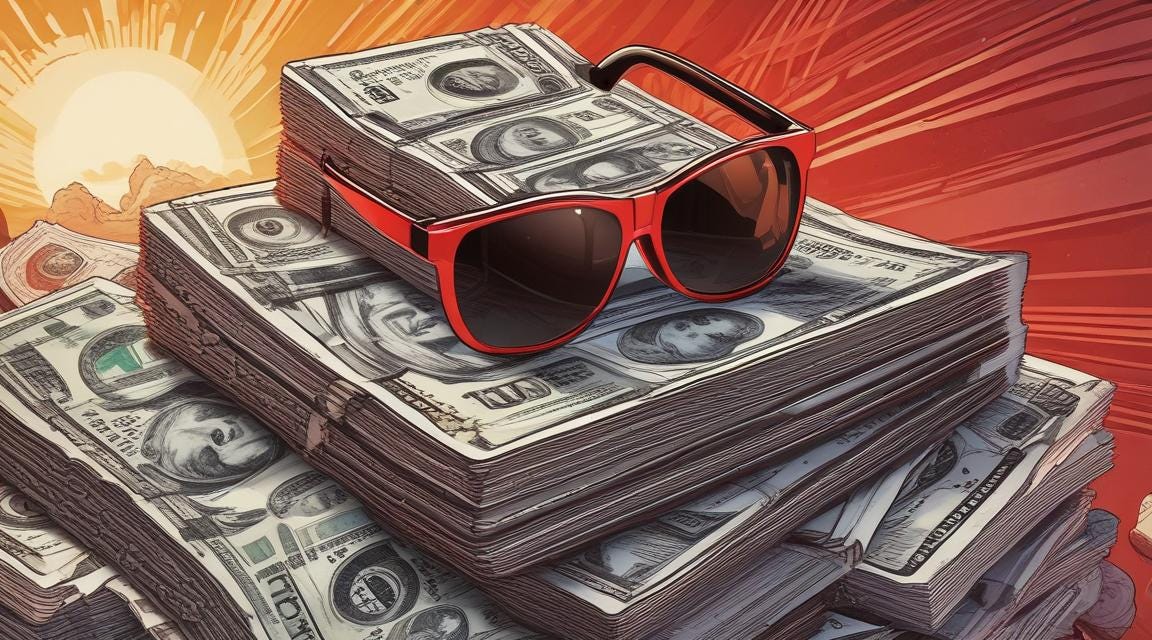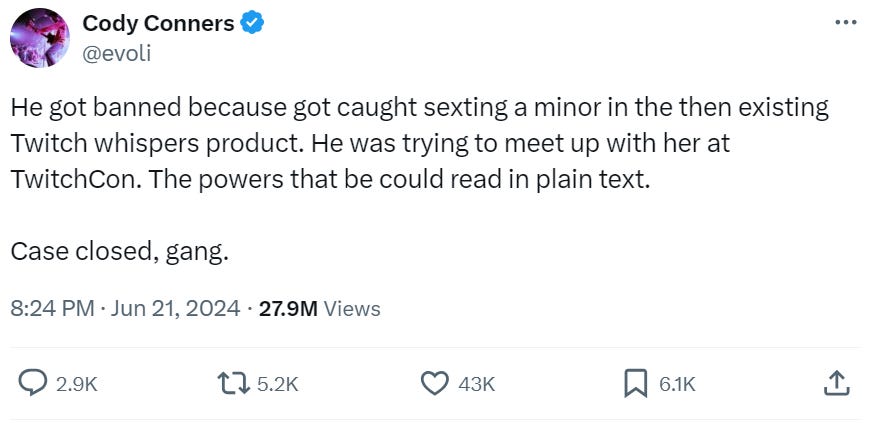Why would Twitch pay DrDisrespect?
If Twitch had clear evidence of inappropriate messages to a minor, why would it settle its arbitration case with Herschel Guy Beahm?

Let’s cut right to the chase. If you’re a company that has clear evidence that a worker is engaging in inappropriate behavior with a minor, and you terminate your relationship with that worker because of that clear evidence, why in the world would you then agree to pay them another dime? That’s what the Amazon-owned, live-streaming platform Twitch apparently did when it settled its arbitration case with Herschel Guy Beahm, better known to millions of video game fans as the wildly popular streamer DrDisrespect.
The question has vexed me for years, but even more now given recent revelations. In a statement posted to Twitter/X on June 25, Beahm admitted to exchanging a series of “inappropriate” messages with a minor using the private messaging app of Amazon-owned live-streaming platform Twitch. This confirmed multiple recent reports that stated Beahm was banned from Twitch in 2020 because of this exchange, which occurred in 2017 per Beahm’s statement. The ban was stunning news since it fell shortly after Beahm inked a massive contract to stream exclusively on Twitch that was believed to be eight figures. It was made even more shocking by the fact that Twitch provided no explanation for it.
The reason for the ban remained a mystery until last week when former Twitch employees brought the answer to light. One of them, Cody Conners, described the exchanges between Beahm and the minor as “sexting” in a seemingly unprompted Twitter/X post this past weekend. While the post from Conners did not name Beahm, The Verge published a story referencing a second, anonymous Twitch employee who confirmed Conners’s post applied to Beahm’s ban.
In Beahm’s brash, profanity-riddled post on the 25th, he described the exchange with the minor as “casual, mutual conversations that sometimes leaned too much in the direction of being inappropriate, but nothing more. Nothing illegal happened, no pictures were shared, no crimes were committed, I never even met the individual.”
That description precedes mention of “a lengthy arbitration regarding a civil dispute with twitch [sic] and that case was resolved by a settlement. Let me be clear, it was not a criminal case against me and no criminal charges have ever been brought against me.”
Beahm has previously stated he was paid out by Twitch as part of that settlement. And that leaves me with my big question: Why would a company, one that can clearly see these messages going to a minor, pay Beahm a dime when it seemingly has iron-clad evidence of misconduct?
To get a better sense, I reached out to an employment lawyer familiar with these sorts of situations. (He requested anonymity since he did not have approval from his employer to speak with me on the record. I will also disclose that I bought him an iced latte for his time.)
Another disclaimer: To be very clear, this is informed speculation based on the lawyer’s knowledge of federal and state employment laws and the inner workings of major corporations where the occasional employee steps out of line. This is not at all definitive or reflective of what happened in the case of Twitch and Beahm. That said, he raised two very interesting scenarios as to why Twitch may have decided to pay someone it caught trading inappropriate messages with a minor.

The scenario the lawyer raised was if Beahm was banned from the platform for violating the terms of service rather than breaching his contract with Twitch. While his actions certainly violated the platform’s terms of service, if his contract did not carry a morality clause (phrasing that prohibits conduct that could be embarrassing for the contracting company, which would certainly include actions like trading inappropriate messages with a minor), then Beahm’s lawyers could argue that Beahm had not violated the contract. Moreover, by banning him from the platform, Twitch could be seen as prohibiting him from fulfilling his side of the contract.
Not including a morality clause in a contract rumored to be for tens of millions would be, um, an oversight by Twitch. And it may have given Beahm enough leverage to bargain for a settlement in arbitration. In this scenario, even though Beahm’s actions were clearly in the wrong, by the terms of the contract, he would likely still be entitled to the money.
The lawyer added that there could have been an additional complication that transcended Beahm’s case and extended to the employment status of other big streamers like Tyler Blevins (better known as Ninja to those under 30) and Turner Tenney (Tfue). Based on the exclusivity component of the deals, the lawyer said streamers like Beahm would almost certainly need to be categorized as employees, which carries both legal and taxation implications. If Twitch had misclassified Beahm and its other mega streamers as contractors, a lawsuit from Beahm could have opened a much bigger and more costly can of worms for the company. That would also make a settlement seem like a reasonable solution.
Again, this is theory, not fact. But these two elements might help explain why someone who has confessed to engaging in inappropriate behavior with a minor actually got paid real money while the company kept the misconduct inside a chamber of secrets.
In the aftermath of the Twitch ban, Beahm migrated his stream to YouTube, where, as of Friday morning, he had a following of more than 4.7 million. He also co-founded a game company, Midnight Society. In many ways, it remained business as usual, with Beahm streaming and establishing new revenue-generating partnerships. Following his public admission, that all began to unravel.
Earlier this week, Midnight Society announced it had parted ways with Beahm. On Thursday, a number of partners, including YouTube, ended or paused their relationship with him. A YouTube representative told PC Gamer, “We have suspended monetization on Dr Disrespect’s channel for violating our Creator Responsibility policy.”
Given the fallout following Beahm’s admission, I wondered how this all may have played out differently if Twitch disclosed the reason for the ban back in 2020. Given the involvement of a minor, I also wondered if there was a requirement for a company to report incidents of this sort to law enforcement. (If Conners’s description is accurate, sexting with a minor is illegal in California.) The answer from the lawyer: They are not, so long as there is no child pornography or exploitation. (In Beahm’s statement he said the messages did not involve pictures and he did not meet the minor in person.)
While it feels like the system failed in this instance, it actually functioned as designed, the lawyer said. Twitch has no legal obligation to the public in this instance. Whether it has a moral one is another issue, but that was potentially complicated by the contract and arbitration case with Beahm. While neither Beahm nor Twitch admitted to any “wrongdoing” in their settlement with each other, it sure seems like there were big mistakes made by both sides that allowed this situation to endure far longer than it should have.
Given how it all played out, and how there appear to be fewer protections in this digital era than one might assume, I asked the lawyer if there were any lessons here for the public.
“Keep your kids off the internet,” he said.
Hi, I’m Mike. I’m a former editor for The Washington Post and ESPN. In 2024 I founded and now operate Launcher, LLC, a digital media consultancy operating out of Arlington, Va. Want to work together? Reach out on LinkedIn.
Read more
Are video games and Marvel as important as Trump coverage? Yup.
In the midst of the Trump presidency, The Washington Post’s leaders correctly identified that its readership’s unique fixation with the president (you love him, you hate him, you still read about him) would likely wa…






Real great explanation, surprised this isn't getting more looks with the situation